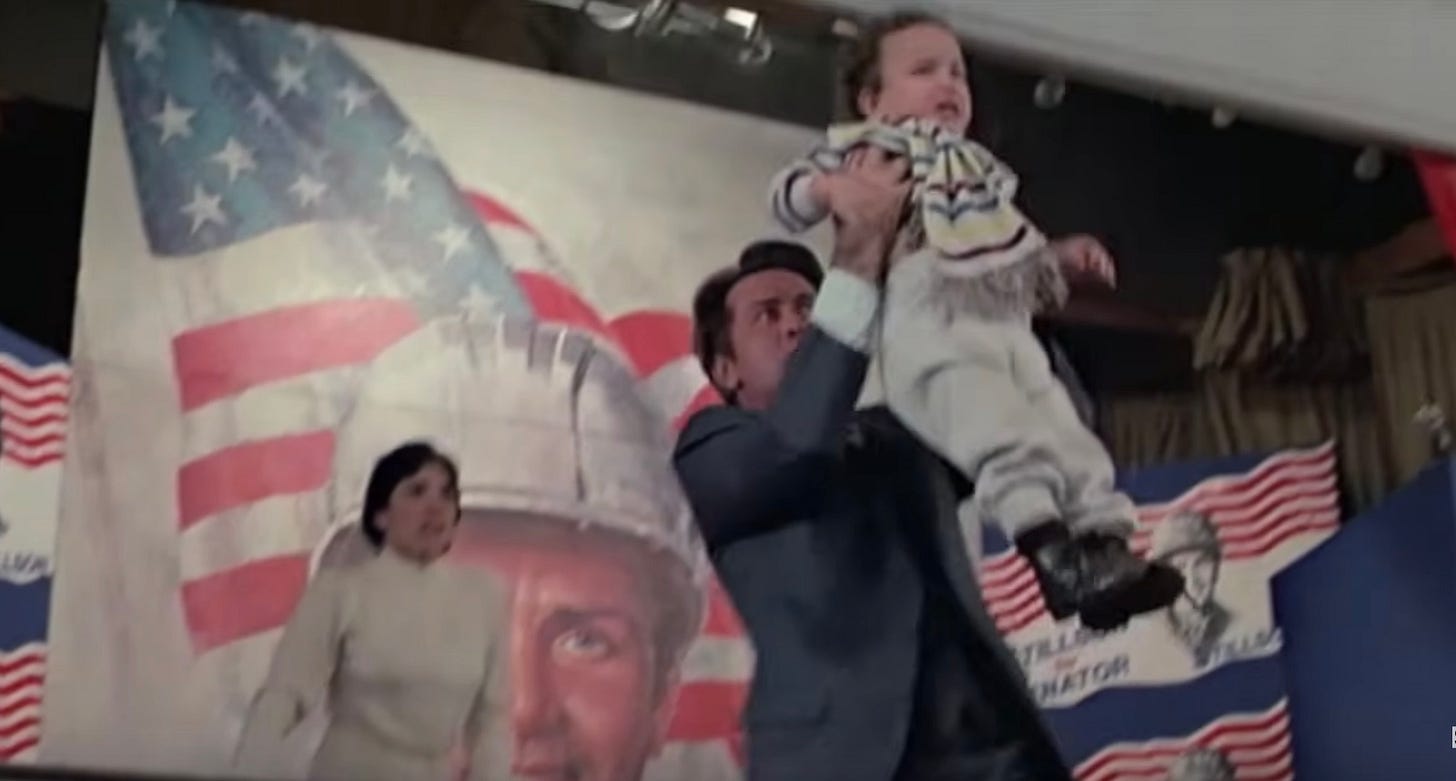There are some who claim that Stephen King’s The Dead Zone predicted the rise of Trump, a novel about precognition becoming its own act of prescience. Stephen King himself has not shied away from the comparisons.
“I was sort of convinced that it was possible that a politician would arise who was so outside the mainstream and so willing to say anything that he would capture the imaginations of the American people. My worry at the time that I wrote ‘The Dead Zone’ was that somebody like Greg Stillson might actually get elected and rise through the ranks, become president of the United States and start World War III.1”
"I know that American voters have always had a real attraction to outsiders with the same kind of right-wing ‘America First’ policy. And if that reminds people of Trump, I can’t be sorry because it was a character that I wrote. It was a boogeyman of mine, and I never wanted to see him actually on the American political scene, but we do seem to have a Greg Stillson as president of the United States."
David Cronenberg, who directed the film adaptation, had a similar reaction. "(Stillson) was a character invented by Stephen King, of course, but it turned to be very George W. Bush-like and then even more like Donald Trump as it turns out. Unfortunately, you invent monsters and they come to life.”2
No question that The Dead Zone — a novel I’ve read at least 20 times since I picked it up from the Old Bridge Public Library as a teenager — hits differently in the MAGAcene. (But then again, so does It Couldn’t Happen Here by Sinclair Lewis.)
If you haven’t read King’s novel or seen Cronenberg’s brilliant adaptation, you should. I’ll keep the spoiler-iffic synopsis brief: John Smith emerges from a five year car-crash coma with psychic powers — prescience and postcognition, to be exact (of the psychometric kind). His health and life in shambles, Johnny is a hollowed-out recluse who is eventually recruited to help catch a serial killer. Later, during one of his tutoring gigs, Johnny runs into Gregg Stillson, a Congressman running for president. Stillson is a Trump-like figure (or Trump is a Stillson-like figure), a popular buffoonish populist who wears a hard hat as a symbol of his movement and promises to clean up Washington DC and send all the pollution to the moon in Hefty bags.
Stillson, who everyone calls a clown, also happens to be a corrupt murderous psychopath. The brush with Stillson inflicts on Johnny a horrifying vision: Stillson, as president, triggering a nuclear war that ends the world. (The scene in the movie — with a transported Martin Sheen declaring The Missiles are flying: Hallelujah, Hallelujah — is as terse a distillation of Christian American apocalypticism as you’ll ever encounter.) After some temporizing and with his life ticking down because of a brain tumor, Johnny decides Stillson must be killed for the sake of all life on the planet. Johnny attempts to sniper Stillson at one of his rallies, misses with his first shot, and is subsequently mortally wounded by Stillson’s bodyguards. Amidst all the chaos a young photographer snaps a damning picture of Stillson that destroys Stillson’s campaign, and averts nuclear annihilation.
Reading The Dead Zone again, as I did recently3, had me thinking that King’s novel was not only remarkably prescient in regard to Stillson, but optimistically of-its-time in other ways. In our fractious age of disinformation the real fantasy of the novel is not that Johnny Smith has psychic powers, but that a photograph or any artifact of wrongdoing could derail a candidate like Donald Trump.
In light of the attempted assassination, which killed Corey Comperatore and critically injured two others, I’m sure I am not alone in recalling (and being recalled by) The Dead Zone.
But where the novel proposed that a photograph (and the moral repugnance of an earlier time) could end a presidential campaign, the events in Pennsylvania have seemingly ignited fears on the Left that the reverse might be true: that a different kind of photograph, of a bloody defiant Trump, might propel him back to the White House.
The Dead Zone, however, offers guidance on this front as well. In the novel, King makes a sideways argument that what ultimately holds dark futures at bay are not superpowers or rifle-toting assassins or even photographs, but the everyday courage and morality of everyday people.
The Dead Zone’s most resonant augury is, in the end, its simplest: if enough people find their courage, their moral centers, there will be no Stillsons, no hallelujahs.
As Johnny’s final words remind us: Nothing is ever lost... Nothing that can't be found.
Not courage or hope or the solidarity needed to win elections.
https://www.indiewire.com/features/general/stephen-king-trump-presidency-scarier-than-novels-horror-1202157578/
https://www.yahoo.com/entertainment/martin-sheen-david-cronenberg-stephen-king-the-dead-zone-greg-stillson-donald-trump-154419382.html
I read it before going on on Erik Hanson’s amazing Cradle to the Grave podcast to talk about Cronenberg’s adaptation, and read it again a few months later. https://cradletothegrave.buzzsprout.com/2037594/13865046-episode-26-1983-part-2



Cronenburg's adaptation I have seen multiple times, a great movie, thank you for reminding me.
That depends on which Trump you’re talking about. He has been quoted contradicting himself on several occasions. He mainly wants to leave our various partnerships like NATO which would destabilize Europe. He wants to let Russia win against Ukraine , as if they would stop there. He idolizes strong men like Putin while being a coward against such dictators.
How anyone can think that a politician who caused the Jan 6th insurrection is some kind of a dove is mind boggling.